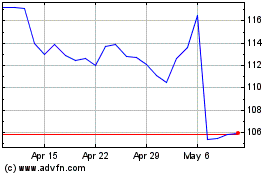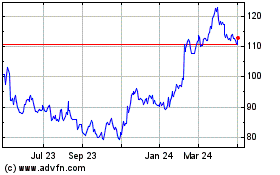Saudis Woo Hollywood During Crown Prince Visit
April 05 2018 - 6:03PM
Dow Jones News
By Erich Schwartzel and Margherita Stancati
LOS ANGELES -- Hollywood turned a little bit Saudi this week,
down to the white wine glasses full of mineral water.
That was the drink of choice at one of many events hosted by a
delegation from Saudi Arabia feting the country's film industry,
which until a few months ago hardly existed. Now, with cinemas
about to open in the kingdom after a three-decade ban and billions
of dollars committed by the government to entertainment, two very
different worlds are coming together for the first time.
At a Saudi film festival in a theater owned by the Academy of
Motion Picture Arts & Sciences, a "deep tech" DJ from the
Hollywood Hills with shoulder-length hair and a black fedora sipped
a fruit juice while chatting with date merchants in traditional
Saudi dress.
"Most Hollywood parties have a lot more Champagne," said the DJ,
Chris Fitzmorris.
From the virgin cocktails to the grandiose plans for sprawling
soundstages across the Saudi desert, the week was a sneak preview
of what the Saudi-Hollywood relationship might look like: a bit
surreal but potentially lucrative.
It coincided with the visit of Saudi Crown Prince Mohammed bin
Salman to California. He is here to pitch the kingdom as a business
destination, part of his plan to transform the conservative
petrostate into an open, 21st-century economy. To do that, he needs
Hollywood's help.
Theater-chain executives, studio chiefs and soundstage managers
attended a symposium organized by the Saudi delegation at the Four
Seasons in Beverly Hills on Wednesday. The Saudis are trying to
secure partnerships between their country and executives at
companies like Walt Disney Co. and studios Warner Bros. and
Universal Pictures.
Such a partnership occurred, albeit on a much smaller scale, on
"Jaber." The short film brought together Saudi director Abdulrahman
al-Jandal and Burbank, Calif.-based producer Nicholas Joseph Cunha.
Set between Los Angeles and the Eastern Saudi city of Alkhobar, the
film was shot in California.
Mr. Cunha, who mostly works on hip-hop videos, said the Saudi
market provided a fresh set of opportunities. "It's a place that's
never been touched," he said, finishing a cardamom-infused Arabic
coffee at Wednesday's event.
Guests sipped cocktails featuring chia seeds and maple syrup and
named after classic films like "Singing in the Rain" and
"Casablanca." Snacks included "salty Saudi pancakes" and spiced
rice with lamb -- a Saudi staple, here served in little jars.
A variety of dates were on hand, brought to Hollywood from the
Saudi oasis town of Al Hasa. "These are my signature products,"
said farmer Khalid al Ramadan, pointing to dates with pistachio
filling covered in white chocolate and rose petals.
It is Mr. Ramadan's first time in the U.S., but he says American
culture feels familiar to him. "It's because of Hollywood," he
said.
But California's gender-neutral bathrooms and LGBTQ-friendly
culture is an odd match for Saudi Arabia, home to an austere
interpretation of Sunni Islam where gender segregation is still
widely practiced, with unrelated men and women not officially
allowed to mix in public, and heterosexual relations outside
marriage are banned.
Under Prince Mohammed, Saudi Arabia's strict social rules are
relaxing -- a push partly intended to make the kingdom more
attractive to foreign investors. From June, women will be allowed
to drive. And later this month, the country's first commercial
cinema in 35 years will open, courtesy of AMC Entertainment
Holdings Inc. Executives expect a box office of about $1 billion
within five years, potentially turning the country into a new trove
of found money for Hollywood.
Questions remain about the economics of the market, including
how much money from ticket sales will flow back to studios or what
censorship requirements Saudi officials will demand.
The country is looking to build its entertainment industry in
other ways. Its sovereign-wealth fund is moving to buy a stake in
Endeavor LLC, a company that includes the world's largest talent
agency, Saudi officials have said.
Until recently, the Saudi film industry only existed
underground. Religious conservatives vociferously opposed attempts
to lift the country's ban on cinemas, and aspiring filmmakers at
best could hope to show their films in theaters abroad, or in rare
private screenings inside the kingdom.
"Lots of companies are coming to this market. It's a big market
-- people are thirsty for entertainment," said Ahmed Almulla, the
organizer of a film festival in the kingdom. "But for Saudi artists
who make their own films, it will be hard. The competition will not
be fair and easy."
(END) Dow Jones Newswires
April 05, 2018 17:48 ET (21:48 GMT)
Copyright (c) 2018 Dow Jones & Company, Inc.
Walt Disney (NYSE:DIS)
Historical Stock Chart
From Mar 2024 to Apr 2024

Walt Disney (NYSE:DIS)
Historical Stock Chart
From Apr 2023 to Apr 2024
